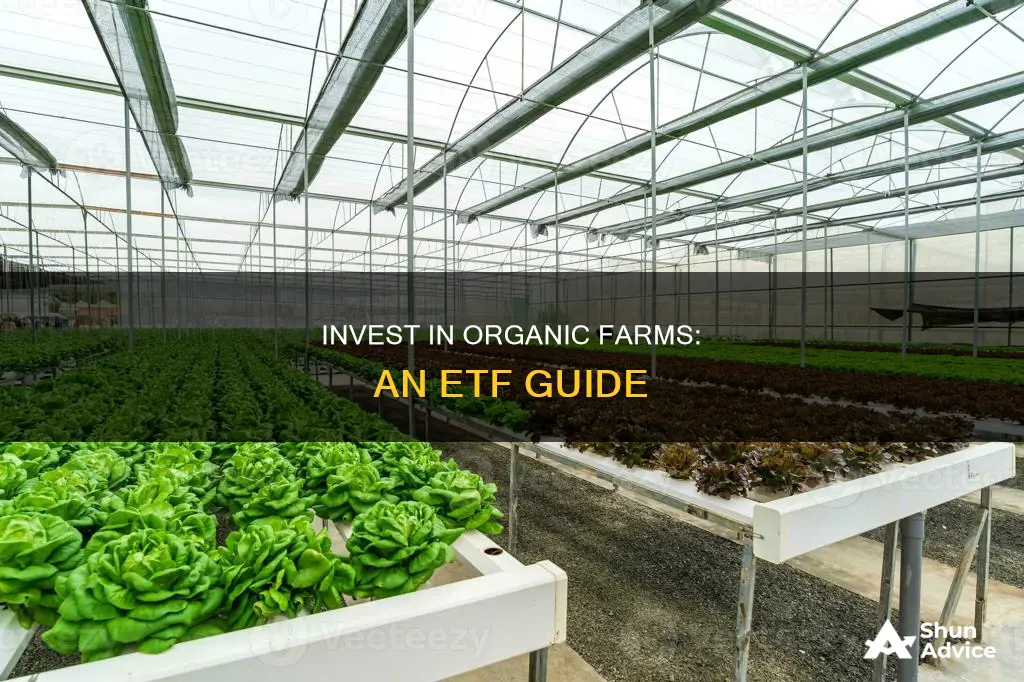
The rise of organic food and farming has been accompanied by a growing interest in investing in the sector. As consumers become more conscious of the environmental and health benefits of organic products, investors are presented with an opportunity to align their investments with their values and lifestyle choices. Exchange-traded funds (ETFs) are one way to gain exposure to the organic farming sector, with The Organics ETF (ORG) being a notable example. This ETF, managed by Janus Henderson Investors, seeks to invest in companies globally that can capitalise on the increasing demand for naturally derived food and personal care items. It provides investors with the opportunity to support organic farming operations and companies that provide organic food, beverages, and cosmetics.
Another way to invest in the organic sector is through individual companies that are focused on organic products, such as Sprouts Farmers Market (SFM), Hain Celestial Group (HAIN), and WhiteWave Foods Co. (WWAV). These companies have established brands and a strong presence in the organic market, making them attractive investment opportunities.
Additionally, investors can consider supporting industries that are integral to the organic farming sector, such as fertiliser and seed providers, farm equipment manufacturers, and crop distributors.
The growing demand for organic products, both domestically and internationally, makes the organic farming sector an attractive investment opportunity for those looking to align their investments with their values and support sustainable and natural practices.
| Characteristics | Values |
|---|---|
| Name | The Organics ETF (ORG) |
| Launched | 2016 |
| Management company | Janus Henderson Investors |
| Management fees | 0.50% |
| Trade price | 0.67% premium to net asset value |
| Distribution yield | 0.84% |
| Asset base | $13.3 million |
| Number of companies | 25 |
| Number of continents | 4 |
| Largest holding | CHr Hansen Holding (CHYHY) |
| Second-largest holding | Hain Celestial Group Inc. (HAIN) |
| Other significant positions | Sprouts Farmers Market (SFM), United Natural Foods (UNFI), Wessanen (KJWNF), Ariake Japan Co. (AKEJF), L'Occitane International S.A. (LCCTF) |
What You'll Learn

The Organics ETF (ORG)
ORG's investment strategy is to generally match the performance of the Solactive Organics Index. The fund currently holds 25 companies spread across four continents, with 40% of the portfolio divided equally between U.S.-based organics manufacturer and marketer Hain Celestial Group Inc. and Danish biosciences company CHr Hansen Holding.
Other significant positions in the fund include Whole Foods supplier United Natural Foods, natural and organic foods grocer Sprouts Farmers Market, Dutch organic brand Wessanen, and natural soups and stocks specialist Ariake Japan Co. Personal products manufactured with natural ingredients form a secondary focus, with L'Occitane International S.A. being an example of a company in this category.
As of its report on November 30, 2017, the fund had a year-to-date return of 37%, outperforming the MSCI All Country World Index (AWCI). The Organics ETF charges a 0.50% expense ratio and currently trades at a premium to net asset value of 0.67%, with a distribution yield of 0.84%.
Roughly half of the fund is invested in mid-capitalization stocks, with large- and small-cap stocks comprising 20% and 30% of the portfolio, respectively. The average market cap of the fund's holdings is $4 billion.
The Organics ETF offers investors a diverse range of global companies in the organic food and products industry, providing both social impact and the potential for credible returns over the long term.
Vanguard's Guide to Investing in External ETFs
You may want to see also

Farmland REITs
A farmland REIT (real estate investment trust) is a company that owns and manages farmland properties and generates revenue by leasing the land to farmers.
Benefits of Farmland REITs
- Portfolio diversification: Farmland offers investors uncorrelated returns compared to other major asset classes such as stocks, bonds, and cryptocurrencies, making it an excellent way to diversify a portfolio and reduce its overall volatility.
- Inflation hedge: Historically, there has been about a 70% correlation between the value of US farmland and the consumer price index. Farmland investments with participation rents also tend to benefit from inflation as rising food prices enable farms to sell their crops for a higher price.
- Attractive total returns: Farmland provides investors with two sources of returns: rental income and capital appreciation. Together, these delivered an average annual return of 11% from 1992 to 2021.
- Accessibility: Farmland REITs enable anyone to invest in farmland, which has historically been accessible only to farmers or wealthy individuals due to the high cost and operational expertise required.
- Liquidity: As farmland REITs are publicly traded like any other stock, they are very liquid and easily accessible for investors.
Risks of Farmland REITs
While farmland has been an excellent long-term investment, it does come with some risks:
- Interest rate risk: Rising interest rates make it more expensive for REITs to borrow money, which can affect their ability to make acquisitions. REIT valuations also tend to fall during periods of rising interest rates as investors are drawn to more attractive lower-risk options.
- Natural disasters: Droughts, wildfires, insect infestations, and other natural disasters can affect a farm's harvest and ability to pay rent.
- Crop prices: Crop prices can be very volatile, especially for annual commodity crops such as corn, soybeans, and wheat, which can impact farm income.
- Farmer-tenants: Although farmland has been an excellent investment, farming has been a challenging business due to natural disasters, crop prices, equipment and labour costs, debt, and other issues. If farmers run into financial trouble, they might not be able to make their rental payments.
Top Farmland REITs
There are only two major players in the Farmland REIT industry:
- Gladstone Land (NASDAQ: LAND): Gladstone Land currently owns over 140,000 acres of farmland across 14 states in the US, primarily used for growing fruits, vegetables, and nuts. While Gladstone Land has paid consistent monthly dividends since its IPO in 2013, its focus on specialty crops and concentration in a few states could make it more vulnerable to market fluctuations.
- Farmland Partners (NYSE: FPI): Farmland Partners owns over 158,000 acres of farmland across 17 states, leased to farmers who grow a variety of crops. Compared to Gladstone, FPI is more diversified in terms of crop types and tenants. FPI also offers loans and financing to farmers, providing an extra revenue stream but adding complexity to its financials.
ETFs: A Smart Investment Strategy for Your Money?
You may want to see also

Publicly traded crop production firms
There are several publicly traded crop production companies that you can invest in. Here are some options:
Crop Protection and Biotechnology
- Corteva, Inc. (NYSE: CTVA): Specialises in providing seeds for a wide range of crops, including corn, soybeans, cotton, wheat, and vegetables, as well as crop protection solutions such as insecticides, fungicides, and herbicides.
- Bayer AG (XETRA: BAYN): A German multinational company with a diverse portfolio, including pharmaceuticals, crop science, and animal health. They develop and manufacture prescription drugs, over-the-counter medications, seeds for various crops, pesticides, herbicides, and veterinary products.
Fertilizers and Chemicals
- CF Industries Holdings, Inc. (NYSE: CF): A global producer and distributor of nitrogen-based fertilizers, which are critical for crop production worldwide. They operate manufacturing facilities in North America and Europe, supplying farmers with ammonia, urea, and other nitrogen-based fertilizers that enhance crop yields.
- Nutrien Ltd. (NTR): The world's largest provider of crop inputs and solutions, this Canadian fertilizer company is a major producer of potash, nitrogen, and phosphate fertilizers, essential for crop growth. They also offer crop protection products and digital agriculture technologies, with a global distribution network.
Farm Equipment and Machinery
- Deere & Company (NYSE: DE): A multinational manufacturer of agricultural, construction, and forestry machinery, sold under the well-known John Deere brand. Their product range includes tractors, combines, excavators, and forestry equipment.
- AGCO Corporation (NYSE: AGCO): A global manufacturer and distributor of agricultural equipment, with brands such as Challenger, Fendt, Massey Ferguson, and Valtra. They produce tractors, combines, and other machinery, primarily for row-crop agriculture.
- CNH Industrial N.V. (NYSE: CNHI): A European industrial company offering tractors, combines, and farm machinery under brands like Case IH and New Holland.
Other Notable Companies
- Iroquois Valley Farms: This private farmland finance company buys farmland and leases it to organic farmers, providing long-term land security. Investors buy an equity stake in the company and can sell it back after at least seven years for the current land value.
- The Organics ETF (ORG): Managed by Janus Henderson Investors, this exchange-traded fund (ETF) allows investors to participate in companies that manufacture or facilitate the trade of organic foods and personal care products. It includes companies like Hain Celestial Group Inc. (NASDAQ: HAIN) and Sprouts Farmers Market (NASDAQ: SFM).
The Ultimate Guide to Investing in Meta ETFs
You may want to see also

Supporting industries
Investors can buy shares in a variety of industries that support organic farming. Some of the largest industries are companies that sell fertilizer and seeds, farm equipment manufacturers, and crop distributors and processors.
Fertilizer and seeds: A potential investor will want to determine how much of each firm's revenue is derived from agriculture, as some also provide services to other sectors. Among the publicly traded companies selling fertilizer or seeds are Nutrien Limited (NTR) and The Mosaic Co. (MOS).
Equipment: Modern farming is an equipment-intensive activity, so investors can gain exposure to the sector by making investments in equipment manufacturers with an agricultural focus. Two firms heavily involved in farming equipment are Deere & Co. (DE) and AGCO Corp. (AGCO).
Distribution and processing: Some companies provide the infrastructure that moves crops from the farm to the local grocery store. Among those that transport, process, and distribute crops are Archer Daniels Midland Co. (ADM) and Bunge Limited (BG). As with equipment manufacturers, some of these distributors only derive a portion of their revenues from agriculture-related activities.
TD Direct Investing: Are There Charges for ETFs?
You may want to see also

Exchange-traded funds (ETFs)
The Organics ETF (ORG), managed by Janus Henderson Investors, is an example of an ETF that focuses on organic farming operations and companies. The fund seeks to match the performance of companies that can capitalise on the growing consumer demand for naturally derived food and personal care items. As of 2019, the top holdings of the fund included Chr Hansen Holding A/S, Sprouts Farmers Market Inc, and Hain Celestial Group Inc.
Another example of an agricultural ETF is the VanEck Agribusiness ETF (MOO), which offers access to a diversified set of businesses, investing in companies that derive at least 50% of their revenues from agriculture.
When investing in ETFs, it is important to carefully consider each fund's management fees and the performance of the index it tracks. Additionally, investors should be aware that ETFs may carry more risk compared to investing in a single company, as the fund's performance is tied to a variety of companies that may be affected by changing consumer interests and technological changes.
For those looking for a long-term investment strategy and wanting to align their investments with their values, ETFs focused on organic farming and sustainable practices can be a good option.
ETFs and Insider Trading: What You Need to Know
You may want to see also
Frequently asked questions
ETF stands for Exchange-Traded Fund. It is a basket of stocks that trade on an exchange like a single stock. ETFs are attractive because they have low fees and offer investors a way to invest in a group of stocks for a fraction of the cost.
The Organics ETF (ORG) is an exchange-traded fund that focuses on companies that are positioned to profit from increasing demand for organic products. This includes companies that service, produce, distribute, market, or sell organic food, beverages, and cosmetics.
The Organics ETF has performed well since its inception in June 2016. As of November 2017, it had posted a total cumulative return of nearly 33%. Its year-to-date return of 37% has outpaced the MSCI All Country World Index (AWCI) return of 22% over the same period.
Some of the companies in the Organics ETF include Chr Hansen Holding, Sprouts Farmers Market, Hain Celestial Group, and United Natural Foods.
Besides investing in the Organics ETF, you can also consider investing in farmland REITs, agricultural ETFs, or commodities markets. You can also invest in publicly traded companies that operate in the farming sector or supporting industries such as fertilizer and seeds, farm equipment manufacturers, and crop distributors and processors.







